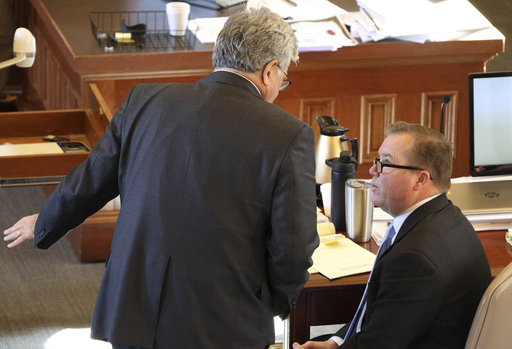The ongoing trial regarding the murder of University of Mississippi student Jimmie “Jay” Lee has revealed inconsistencies in the statements made by the accused, Sheldon “Timothy” Herrington Jr., during police interrogations. Officer Shane Fortner, who played a key role in the investigation, testified about the varying accounts Herrington provided concerning his relationship with Lee.
Jimmie Lee, who disappeared on July 8, 2022, in Oxford, Mississippi, was reported missing two weeks later, leading investigators to question Herrington at his apartment before bringing him to a police facility for a more in-depth interview after ensuring he understood his rights. Fortner, the lieutenant in charge of criminal investigations at the time, recounted that during the initial questioning, Herrington claimed to know Lee but insisted that their relationship lacked any sexual component. However, the second interview showed a stark contrast in Herrington’s narrative, as he asserted they had a more intimate relationship, including a sexual encounter shortly before Lee vanished. This revelation prompted suspicions in Fortner’s mind regarding Herrington’s honesty in the first discussion.
At just 20 years old, Lee was an active member of the LGBTQ+ community and was well-regarded in social circles at Ole Miss, where his disappearance and Herrington’s subsequent trial are taking place. Herrington, currently 24, faces charges of capital murder, despite the absence of Lee’s remains and the fact that a judge has declared him legally dead. Throughout the proceedings, Herrington has maintained his innocence.
Prior to Herrington’s interviews, investigators had uncovered surveillance footage depicting a man believed to be Herrington running away from the parking lot where Lee’s abandoned vehicle was located. They also discovered explicit Snapchat messages exchanged between Herrington and Lee, suggesting a more intimate involvement. Body camera footage presented in court demonstrated Herrington speaking with police officers without legal representation. During this interaction, when asked about Lee, Herrington speculated that Lee might have gone out for casual sex and possibly been abducted. Fortner commented on this, suggesting that Herrington might have inadvertently hinted at his own actions regarding Lee.
Furthermore, assistant district attorney Gwen Agho noted that while Herrington did not openly identify as part of the LGBTQ+ community, evidence would support a relationship between him and Lee, indicating Herrington’s culpability in the alleged murder. In contrast, Herrington’s defense attorney, Kevin Horan, argued that the prosecution lacked concrete evidence proving Lee’s death.
On the day of Lee’s disappearance, his vehicle was found towed from the Molly Barr Trails apartment complex in Oxford, a location unrelated to either individual. Herrington had stated in an earlier interview that he hadn’t been to that area in months, but footage captured shortly after Lee’s car arrived showed a man resembling Herrington jogging away from the scene.
Both Herrington and Lee graduated from the University of Mississippi, with Lee actively pursuing a master’s degree. He was celebrated for his artistic flair, particularly in fashion and makeup, and frequently participated in drag performances in Oxford, as highlighted by a supportive community group advocating justice for him.
Prosecutors have announced that they will not seek the death penalty in this case, implying that if convicted, Herrington could face a life sentence. In Mississippi, capital murder is defined as a homicide occurring alongside another criminal act, such as kidnapping.


